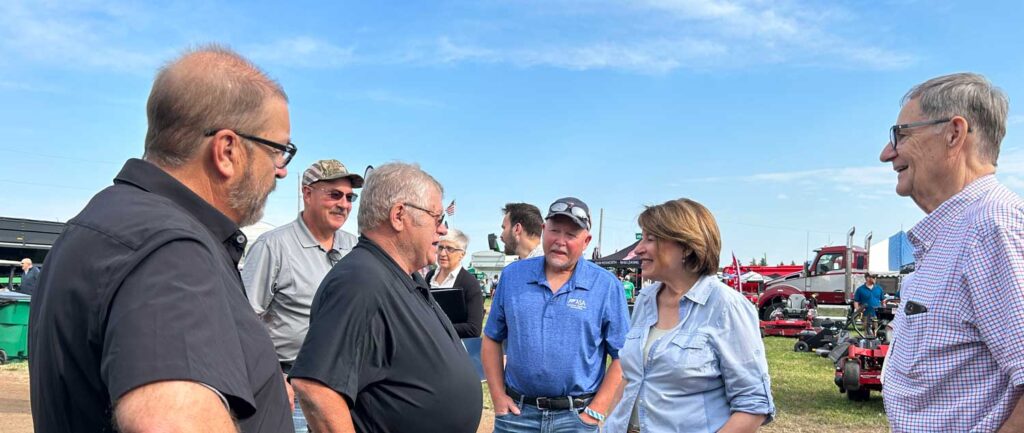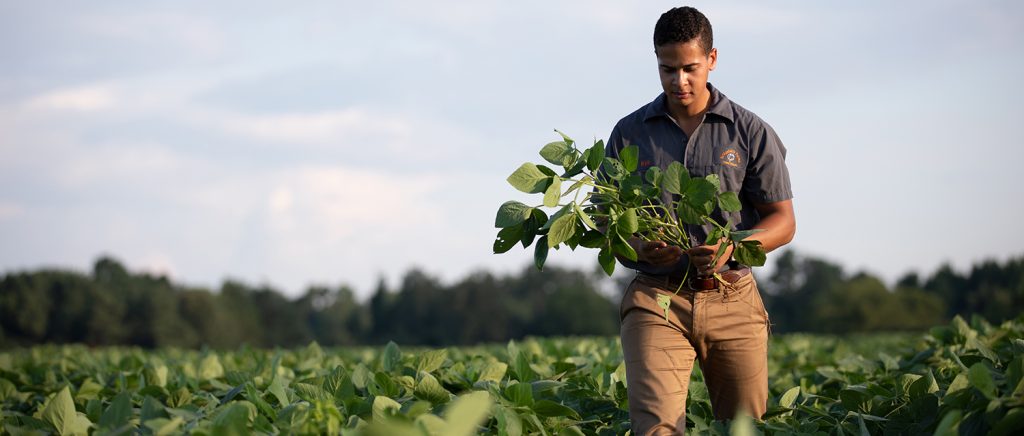Advocating for farm-friendly policy isn’t easy peasy lemon squeezy.
Fortunately for Minnesota’s more than 25,000 soybean farmers, the Minnesota Soybean Growers Association (MSGA) doesn’t shy away from a challenge.
“We are the boots on the ground in St. Paul and Washington, D.C.,” MSGA President Darin Johnson said. “When it comes down to having questions about what’s going on in agriculture in Minnesota, we are the link.”
Amid a tumultuous political climate and an impending harvest, the MSGA governing board swapped their work boots for dress shoes and spent a whirlwind 36 hours in Washington, D.C., Sept. 16-18. The packed agenda began at the Environmental Defense Fund (EDF), where the group met with Andrew Lentz, director of federal affairs and agriculture policy, discussing ways to improve the 40B and 45Z tax credits.
“There was a lot of common ground we found on issues,” said Joe Smentek, MSGA Executive Director. “We understand their desire to cut carbon, and they understood our need for solutions that actually work in our farm operations.”
As sustainable aviation fuel and clean fuel production tax credits, 40B and 45Z could benefit Minnesota soybean growers. However, without key adjustments to the language, growers could watch those opportunities fly out the window. For example, there isn’t anything preventing foreign feedstock producers from taking advantage of the tax credits, limiting benefits that domestic feedstock producers can capture.
“Our farmers are getting hurt because their feedstocks are worth less when other countries ship their product to the U.S.,” Johnson said. “And there isn’t any way to track the sustainable practices that other countries are using when growing their product.”
In addition, the tax credits bundle climate-smart practices that pose problems for producers who are limited by geography and economics.
“Conservation practices are not one-size-fits-all and never will be,” Johnson said. “Sustainability can mean so many different things and, right now, there are a lot of farms that sustainable means just being able to survive and get into the next year. And implementing some of these practices do cost a lot more money.”
With the Nov. 5 election around the corner, agriculture groups across the country are sitting on the edge of their seats, hoping a new Farm Bill will be passed before the end of the year. Unsurprisingly, MSGA stressed the significant role the Farm Bill plays in operations across Minnesota while meeting with elected officials.
The group met with both US Senators and five of Minnesota’s Representatives. The message was pretty clear.
“It’s imperative that we get the Farm Bill done and that we get it done correctly,” Johnson said.
This growing season, Mother Nature has thrown curveballs at Minnesota soybean growers. Between excessive rainfall toward the beginning of the growing season and minimal rainfall at the end of the season, producers are bracing themselves for variable yields.
Highlighting the need for a strong safety net in the farm bill, MSGA Treasurer Rose Wendinger said: “This year, there’s the good, the bad, the ugly and the missing and it’s all in the same field. And when we’re in our combines looking at our yields throughout the field, there’s going to be wide variety even within one field.”
“It’s going to be a huge year as far as crop insurance goes,” Johnson said. “It’s going to be used extensively.”
The group also visited with the Great Lakes St. Lawrence Seaway Development Corporation at the Department of Transportation. The group highlighted the need to get the message out to freight forwarders on the seaway being another export option.
“The Seaway Authority has done some great work with port developments, and our checkoff is working to build new markets to increase demand,” Smentek said. “It is exciting to help push this work to the next level and see soybeans moving to new destinations through the Great Lakes. We are excited to be a part of this and help advocate for more shipments.”
With low crops prices, new demand and policies that help, and not harm, are vital.
“When farmers are profitable, they reinvest in their communities,” MSGA Vice President Ryan Mackenthun said. “We want to show the next generation that farming is feasible.”
As the MSGA governing board flew back to the Land of 10,000 Lakes, they knew there was still a lot of work to do and, with the support of MSGA’s 2,500 members and their membership dollars, they aren’t giving up the fight.
“We know there are a lot of opportunities, but they aren’t going to fall in our lap,” Johnson said.





